Will Schneider, in his recent eJejewish Philanthropy piece Innovation to What End?, states that Innovation is a strategy toward a larger goal, such as creating Jewish community, increasing Jewish literacy, or improving the North American Jewish communitys relationship to Israel. It should not be perceived of, or utilized as, an end in and of itself. It is simply a mindset, and set of tools, that allow us to achieve our overall shared purpose more effectively. It can be utilized within and beyond the walls of established institutions, and it should also be handled responsibly; if something aint broke, theres no need to push innovation at it and try to fix it. And therefore, we dont encourage funders to support the new over the necessary provided they dont fund the existing over the effective. Funders and practitioners alike should focus on purpose: what is it that were trying to accomplish? And what are the most effective and creative approaches and methods we can employ?
Schneider also reminds us that the drive to remain relevant in our changing circumstances has been part of the Jewish communitys DNA for thousands of years. Perhaps a more appropriate term to describe this work of striving to adapt to remain relevant is iteration. As professionals, we articulate goals, imagine ways to meet them, and design systems to achieve our vision. But then people enter the picture. Sometimes they interact with the systems exactly as we had anticipated. But, more often than not, they dont. And then we are left with a choice. Do we defend those systems in which we have invested? Or do we allow them to change shape, spring new structures, or even be abandoned for new systems? Do we focus on the system, or on the people? And is there any middle ground?
I believe that constant iteration is the very language of the Jewish tradition. It is the way in which we communicate, the tongue we teach our children, the cycle that shapes our communal life, and the spine of the Jewish legal system. Moreover, it is modeled in the earliest of our texts the book of Genesis. Take the creation story; God creates a seemingly perfect environment for human beings, puts some ground rules in place, and then sets Adam and Eve inside. The building is built, the ribbon is cut, the programs all planned. And then Adam and Eve go ahead and behave unpredictably (or, predictably; regardless, this is a story of them not behaving according to the way the system was designed). This story can be read as Exhibit A in iteration: Try it Out and Test. Have an idea for creating a world and populating it with human beings? Fascinating. Lets start by imagining a perfect Garden of Eden for them. Have it all figured out? OK, mock it up, and bring in the humans! Uh oh. Dont panic. Perceive it as a learning experience. Send them out of the garden and see what happens. The Jewish tradition does not believe in the fall. This primal story is not an example of the tragedy of humanity. It is an example of how the structures we originally design do not always meet the complex, changing needs of our users. This try it out/test model repeats itself throughout the book of Genesis, and its message is consistent: it is never going to be perfect, nor will it turn out as you imagined it. The challenge: stay focused on those values that are of ultimate importance, and stay flexible and willing to shift and adapt everything else.
In her piece Pro-Creation in this falls edition of the Jewish Review of Books, Dara Horn shares her perspective on the purpose of having children. She writes:
The reason to have more kids is because you care enough about whatever languages you speak, and the chains of stories and ideas and commitments that have carried those languages through time, to want more people to speak those languages in the future, no matter what they may choose to say. Giving children a language rich enough to express the pasts mistakes and the futures possibilities isnt a task for chromosomes. Its a task for parents and teachers.
Perhaps this wisdom applies to the Jewish community as a whole. The goal is not to have everyone speaking the same language, or preserving the same structures, or upholding the same routines. The goal is to convey the nuances of the language so that we can keep writing new stories. The why of preserving the Jewish tradition and the how of preserving this tradition are one and the same. We preserve so that we can grow. And our willingness to grow allows us to preserve what is most precious. We innovate, and iterate, because that is our language, that is the song whose melodies comfort and challenge us still.
Our purpose is to enable entrepreneurs to bring bold Jewish ideas to light. We help them reach Up to people in new ways that are meaningful, more inclusive, and create a brighter future for our Jewish community and the world we share.




